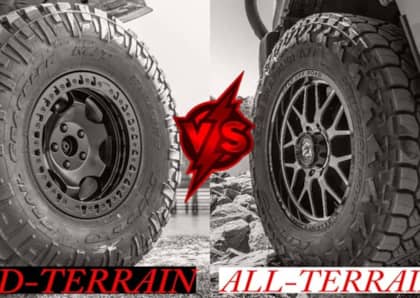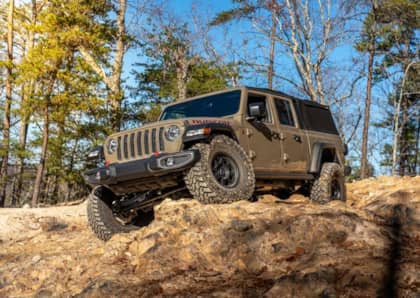Nine Trends From The '90s We Won't Miss

While the '80s were fueled by the excess of Miami Vice and Madonna, the '90s ushered in the grunge era. This transition extended to trucks as well, where the chromed show trucks of the '80s gave way to more functional and flexy ‘wheeling machines. Dents were suddenly more popular than ten chrome shocks with neon shock boots. The trend became so extreme though that if you had a clean vehicle, even if it was ‘wheeled hard, you were branded a poser by kids in dented Toyota pickups.

Naming Your Vehicle
This still happens, particularly with magazine projects, and we are guilty of it ourselves. But, that doesn’t mean that it is a good idea. Even worse is writing the name of your pride and joy on the side of the hood in big swoopy letters. That space should be reserved for “Renegade” or “Golden Eagle”.
Trars
Take one Camaro/Mustang/Nova and put it on a Blazer chassis. Despite what car was used (often muscle cars that are now considered valuable!), the chassis of choice for trars (part truck, part car) always seemed to be a Blazer chassis. They came with a V-8 and the wheelbase was somewhat similar to a lot of cars, at least close enough to make it work. It is a great way to ruin two otherwise good vehicles at the same time.

RTI Scores
In the '80s, trucks used thick, stiff leaf springs that provided room for big tires, but barely any flex. The pendulum swung to the other end of the spectrum in the 90’s with the introduction of the RTI, or Ramp Travel Index. This system scored suspension travel relative to wheelbase on a 20 degree (or sometimes 30 degree) ramp. People were unbolting their shocks and other such nonsense in an effort to get the best RTI score, but the suspension travel didn’t always translate to trail prowess.

OD Green Everything
You could argue that off-roading started when GI’s returned from World War II and bought surplus Jeeps. Those Jeeps were covered in Olive Drab (OD) green and they were cool. OD green is still an appropriate color on a flatfender, as is desert tan. It is not, however, applicable to your late-model Jeep and please, we are begging you here, don’t paint your Toyota pickup or Suzuki Samurai OD green and put a white star on the hood.

Wood Grain
Who ever thought that this was a good idea? Original buggies were made of wood, but then again they were also pulled by horses and no one puts a fake horse in front of their car (now, that would be a sight!). The “woody” look is acceptable on a classic surf wagon (or the family truckster), but plastic wood grain has no business on the side of a Jeep.

Quarter Elliptic Suspension
If RTI ramps are the cause, quarter elliptic suspension was the effect. Prior to the popularity of coilover shocks, four-link suspension were used with leaf springs that were cut in half. They provided incredible flex, but the packaging was difficult, they were heavy, and the damping was inconsistent at speed. The 3/4 elliptical (or buggy spring) and Revolver shackles also fall into the “too much of a good thing” category.

Stingers
We aren't certain who started this trend, but it reached its peak with the Poison Spyder Bruiser chassis, which had a stinger that was as tall as the roof. The premise is good; keep the vehicle from endoing on a steep drop and protect the radiator from breaking in the event of a rollover. In reality though, the giant stingers reduced approach angle and it was still possible to damage your radiator.
Body Damage
‘Wheeling difficult terrain and pushing your limits can result in broken parts and dented sheetmetal. Some people react to this better to this adversity than others. There was a time though when people went out of the way to smash their vehicles as a sign of authenticity. It didn’t really have the desired effect though as a dented vehicle may give the impression that you wheel hard trails, but it doesn’t say much about your driving skills.

Torsion Bars
The '90s saw1/2-ton and downsized trucks move away from the solid axles and leaf springs that they had been using in favor of independent front suspensions with torsion bars. The suspensions were difficult and expensive to lift and the torsion bars made it very problematic to increase wheel travel or adjust the spring rate. While ¾- and 1-ton Chevys still use torsion bars, most models have phased them out in favor of coilover struts.
Trends We Miss From The 90s
Like the '80s, not everything about the '90s was awful. While most factory 4x4 offerings had torsion bars and tiny tires, there were also some features that we pine for today.

TBI Fuel Injection
This was some of the earliest fuel injection, and admittedly, it did not make the most horsepower or the least emissions. TBI is still retrofitted onto carbureted engines for the ease of installation, since it uses minimal computers and sensors and bolts onto the top of a traditional intake manifold. Today, there are even high tech TBI kits from companies like Holley, MSD, and FAST.

Manual Transmissions
Nearly every truck on the market could be purchased with a manual transmission in the '90s. This is the era of the AX-15 in Jeeps, NV4500s in Chevys and Dodges, and W56 transmissions in Toyotas. All components that over time have come to be respected for their strength in wheeling rigs. Today, Jeep still offers a manual transmission in the Wrangler and Toyota in the Tacoma, but forget about getting one in a 4Runner and the only fullsize pickup offered with a manual is the Ram 2500 and 3500.

Manual Doors and Windows
Power door locks and windows are a great convenience, it is hard to argue against that. And these days they are very reliable as well. Still, it is tough to beat the simplicity-of-a-rock manual windows and door locks. You never have to worry about them failing, even when you are up to the top of your doors in water or mud. The fact that they cost less to produce, which translates into a cheaper truck to purchase, is also a benefit in this day and age of King Ranch and Denali pickups.

Manual Locking Hubs
Give us hubs or give us death! As the American public got lazier, they wanted to be able to shift into 4WD from the seat of their truck. So, selectable hubs have gone away with the change from fixed spindles to unit bearings. Now, we got failure-prone front-axle disconnects with two piece axleshafts. Most were vacuum or electronically operated, but the worst of the bunch was the thermally activated Chevy system that was virtually guaranteed not to work in the snow. It turns out that getting out to lock your hubs is far easier than walking back to town for help.
So, what '90s era stuff is your 4x4 still running?











